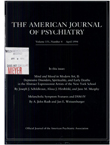Hypothalamic-pituitary-adrenal axis hyperactivity and psychosis: recovery during an 8-year follow-up
Abstract
OBJECTIVE: An earlier study showed that the results of dexamethasone suppression test (DST) predicted outcome among patients with a functional psychosis followed to 1 year. The present study was undertaken to replicate these findings with a different patient group and a longer follow-up. METHOD: Ninety-two inpatients with nonorganic, nonmanic psychoses had DSTs during their hospitalizations. Raters who were blind to DST results, and to baseline chart or research diagnoses, conducted personal interviews with 71 of the patients 8 years later. RESULTS: Patients who had been nonsuppressors on the DST were five times more likely than those who had been suppressors to be free of psychotic features and to exhibit insight at the follow-up interview (42% versus 8%). Prognostic differences between these groups were clear within the first year of follow-up. Baseline diagnoses also strongly predicted outcome, even among DST nonsuppressors, and DST results had no prognostic significance among patients with a baseline diagnosis of schizophrenia. Later ages at onset and short episode durations at intake also predicted recovery, but baseline DST suppressor status remained important after control for these factors. CONCLUSIONS: The findings of this study and those of the earlier follow-up suggest that among patients with a functional psychosis, nonsuppression on the DST is prognostically important, particularly after the exclusion of those who meet narrow criteria for schizophrenia.
Access content
To read the fulltext, please use one of the options below to sign in or purchase access.- Personal login
- Institutional Login
- Sign in via OpenAthens
- Register for access
-
Please login/register if you wish to pair your device and check access availability.
Not a subscriber?
PsychiatryOnline subscription options offer access to the DSM-5 library, books, journals, CME, and patient resources. This all-in-one virtual library provides psychiatrists and mental health professionals with key resources for diagnosis, treatment, research, and professional development.
Need more help? PsychiatryOnline Customer Service may be reached by emailing [email protected] or by calling 800-368-5777 (in the U.S.) or 703-907-7322 (outside the U.S.).



